GOD OF EVERLASTING MERCY.
April 7, 2024.
Second Sunday of Easter - Sunday of Divine Mercy – B.
Readings: Acts 4:32-35; Ps 118:2-4, 13-15, 22-24; 1 Jn5:1-6; Jn 20:19-31.
"Receive the Holy Spirit. Whose sins you forgive are
forgiven them, and whose sins you retain are retained." Jn 20:23
A Chinese proverb says: “The Buddha has mercy even on the
meanest thing.” A Filipino proverb adds: “Mercy resides in God; deeds are in
men.”
At Easter, what we really celebrate is a regeneration, a new
birth, and a new opportunity offered to sinners. The Lord, by dying on the
Cross, took away our evilness and made us new creatures. This newness opens us
to new life. We are given to rediscover our original beauty that we lost in
sin. It is a journey of purification that finds its origin in God's everlasting
and always renewed love.
We are celebrating today, the second Sunday of Easter, the
Divine Mercy Sunday. Our opening prayer already gives the tune of our
celebration: "God of everlasting mercy, who in the very recurrence of the
paschal feast kindle the faith of the people you have made your own, increase,
we pray, the grace you have bestowed, that all may grasp and rightly understand
in what font they have been washed, by whose Spirit they have been reborn, by
whose Blood they have been redeemed."
God's mercy is everlasting and that mercy is the actuation
of his love, which is not only everlasting but also his true identity. St. John
does not hesitate to affirm: "God is love." 1 Jn 4:8.
At Easter, what we celebrate is God's great, forgiving,
everlasting love. Love is, in fact, the central element of the Paschal Mystery.
It was love that led Jesus to the Cross. It was love that nailed him to the
cross. And it was love that raised him from the dead after the three days he
spent in the tomb. And once resurrected, love is his greatest gift to his
disciples and to us, a love that forgives and restores. And ultimately, love is
the only reason we are saved. God's love, which is immeasurable, wipes away our
sins and opens us to life and newness.
On this second Sunday of Easter, Divine Mercy Sunday, we
celebrate the love given in forgiveness. In the first reading, that love is
expressed and proved through communion in the first Christian community. Luke
narrates the life of that community and emphasizes their common concern for
each other. They were of one heart and mind. Moreover, "no one claimed
that any of his possessions was his own." And more, they lived communion
in the community to its fullest. Our societies and our world would be a perfect
place if we were experiencing and ready to live such love. It would be a world
where reign no selfishness and egocentrism, but rather where the brother and
his needs are cared for.
St. John, in the 2nd Reading, though not saying it directly,
tells us that the reason and the means of perfect communion and harmony in a
community is love. It is about loving God through loving his children. Jesus
was able to conquer the world and worldliness and defeat death only by love.
Because of his great love, he is the Victor we celebrate today.
In the Gospel, Jesus, our Victor, appears to his disciples.
After giving peace to their troubled hearts, mandates them: “Receive the Holy
Spirit. Whose sins you forgive are forgiven them, and whose sins you retain are
retained.”
To Thomas the doubtful, the Lord not only shows love and forgiveness for his unbelief but also raises him to greater faith that becomes another Beatitude for us: "Blessed are those who have not seen and have believed.”
The Lord, in his Resurrection, wants us to become
instruments of mercy and love. Let’s, therefore, make mercy, compassion, and
mutual forgiveness our Easter commitment and obligation. It is only then, would
we become the community of the Risen Lord, an Easter community.





Comments
Post a Comment